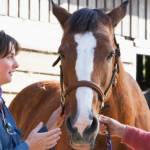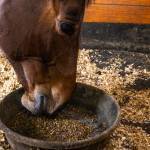Preventative Health Care for Horses: Measuring Trends

Horse ownership brings with it a long to-do list. Long hours mucking, cleaning, and researching the best dietary choices can’t (and shouldn’t) be avoided, and according to a recent study*, neither should veterinary-guided preventive health care.
“Many horse owners think of their veterinarian only in emergency situations and don’t consider obtaining information or advice regarding day-to-day health care, including nutrition, farriery, and dentistry,” noted Kathleen Crandell, Ph.D., an equine nutritionist with Kentucky Equine Research (KER).
A one-year study of Pony Club members by Buckley and coworkers conducted in New South Wales, Australia, revealed some interesting trends in preventive healthcare:
- Foot care was the most regularly administered preventive healthcare;
- Deworming did not follow current evidence-based recommendations. Instead, some ponies were not dewormed at all, others were dewormed excessively, and some were dewormed using anthelmintic products licensed for use in sheep and pigs;
- Less than 40% of ponies underwent dental care;
- Only 4 of the 48 included horses were vaccinated (either tetanus alone or in combination with strangles only). Rabies was not administered because they do not have rabies in Australia; and
- No annual veterinary health checks were performed on any pony.
“This study shows that in some areas of the world most preventive health care for Pony Club mounts is provided either by farriers or the owners themselves. This latter group likely includes some adults without much experience with horses, though they are supporting their budding young riders,” shared Crandell.
According to the study, many young riders may ultimately own horses as adults, which means establishing the importance of veterinary care early in their lives will ultimately benefit the overall health of their future horses.
“This study was also interesting because the nutritional management of the ponies was not addressed, especially so because Pony Clubs typically feature nutrition as a focal point in their educational programs as nutrition is the cornerstone of health and longevity,” said Crandell.
Contact a KER nutrition advisor today for help with your horse’s nutrition.
*Buckley, P., D. Buckley, G.T. Coleman, et al. 2016. Preventive health care of Pony Club horses in rural New South Wales, Australia. Australian Veterinary Journal. 94(8):265-270.








